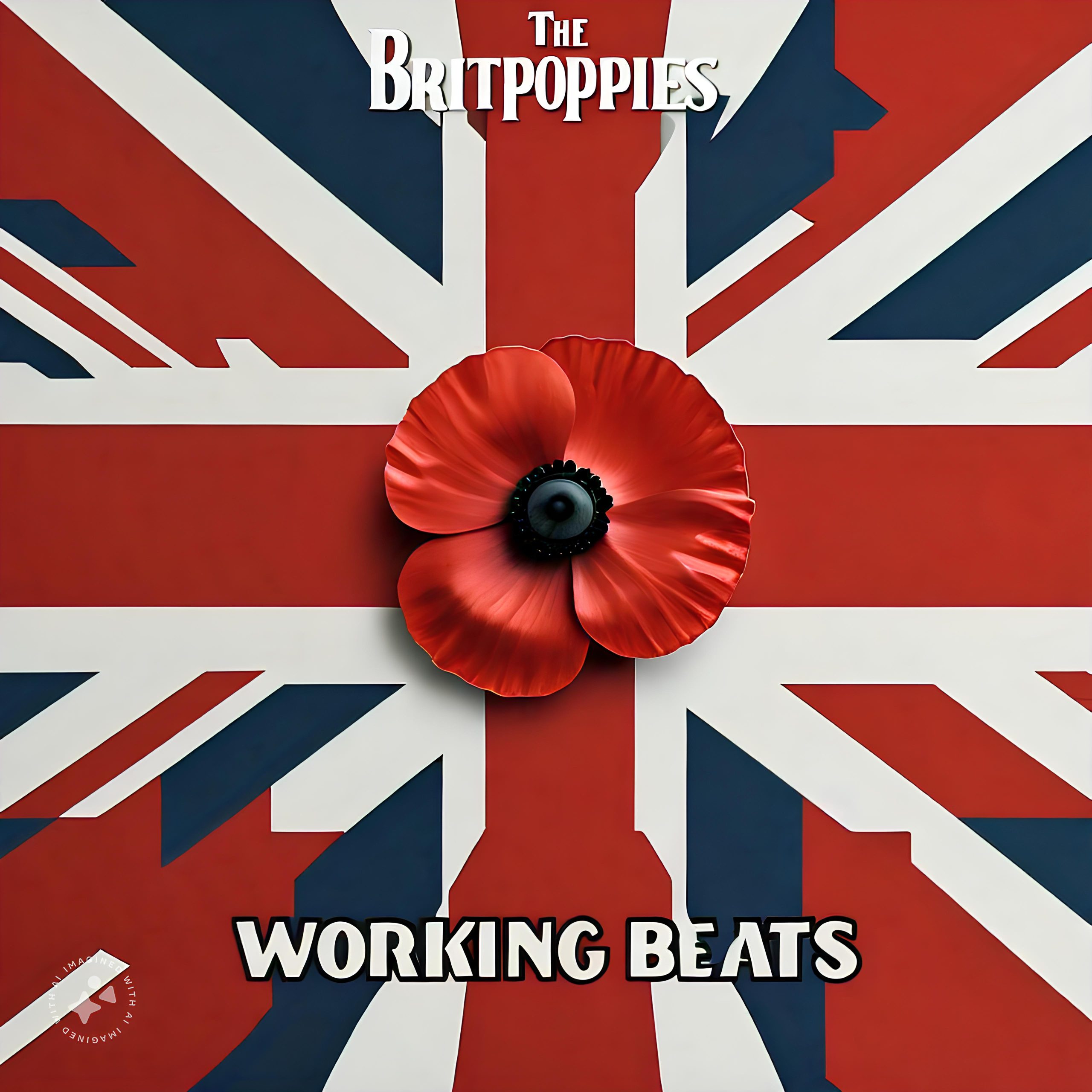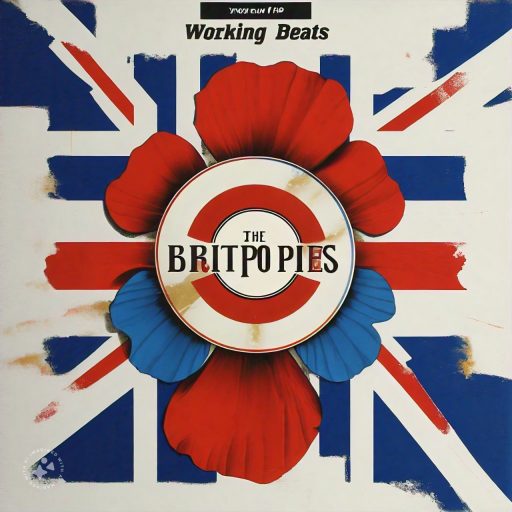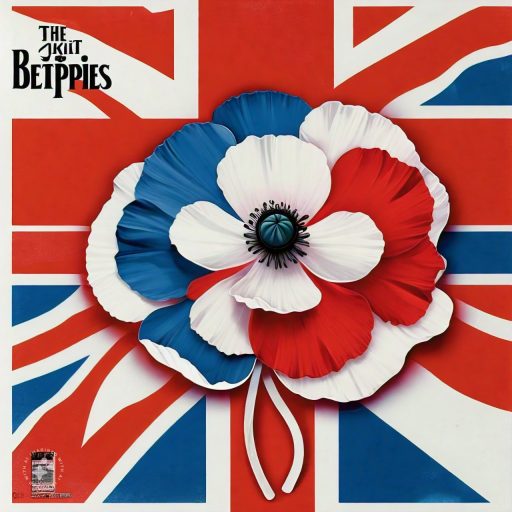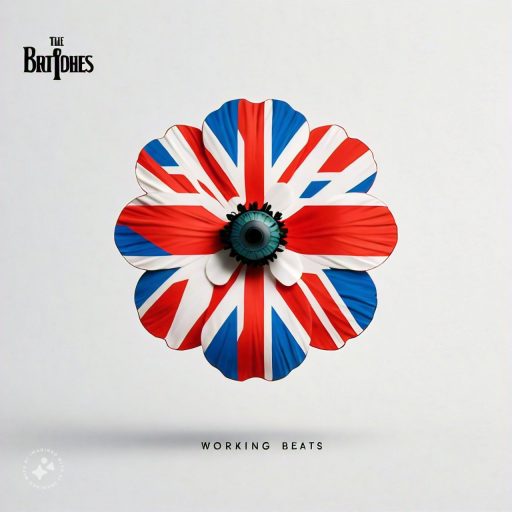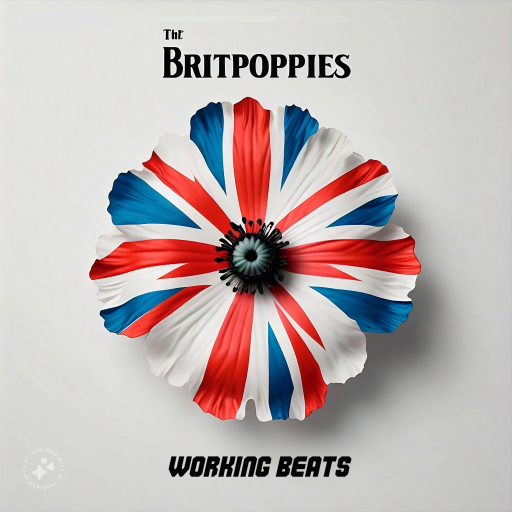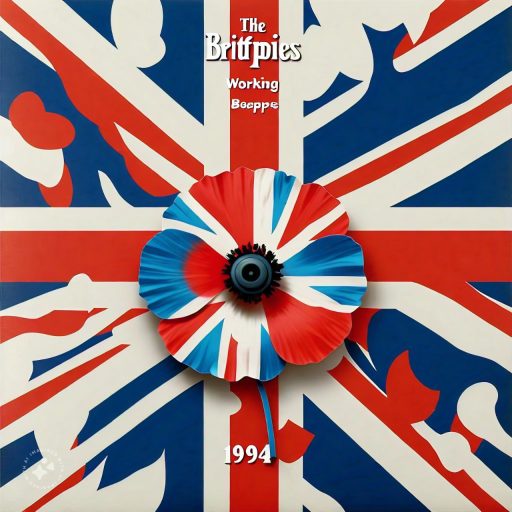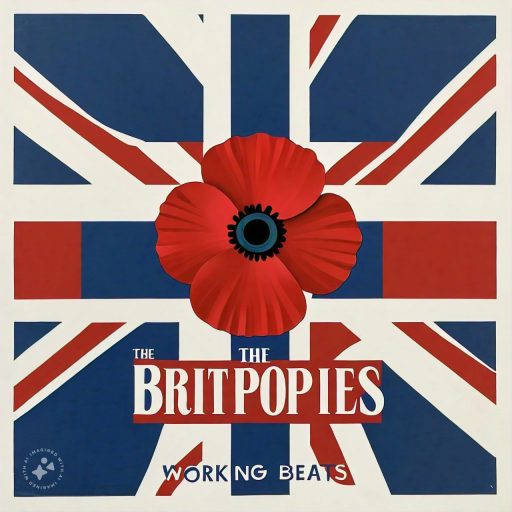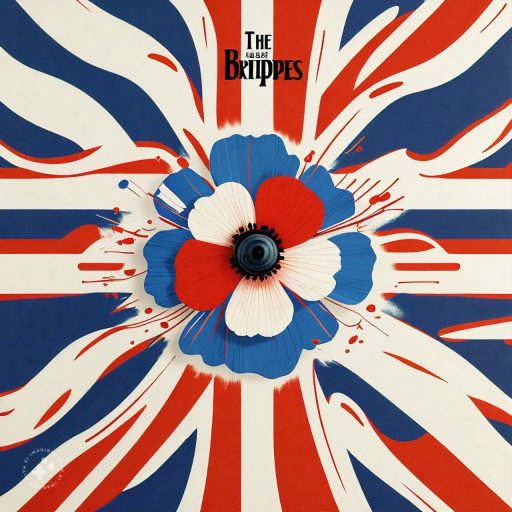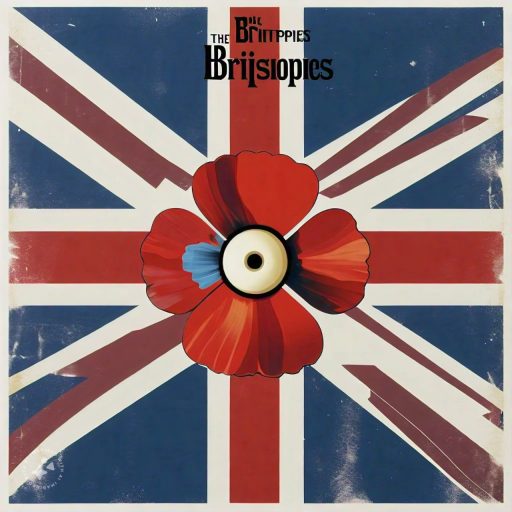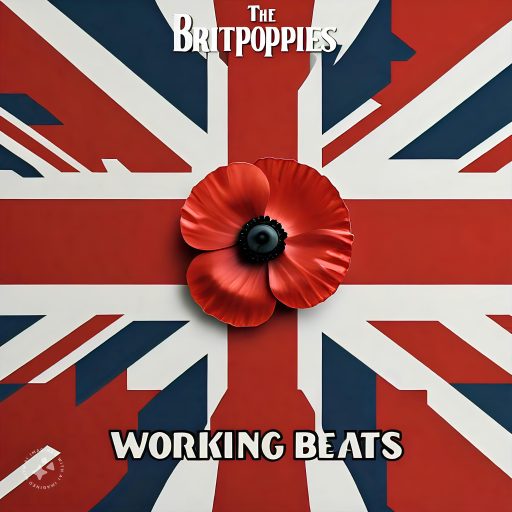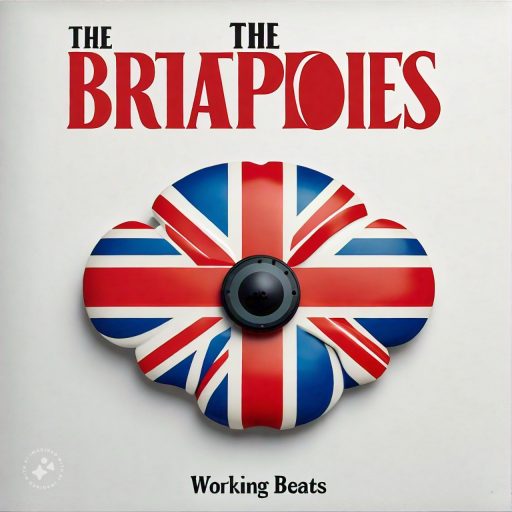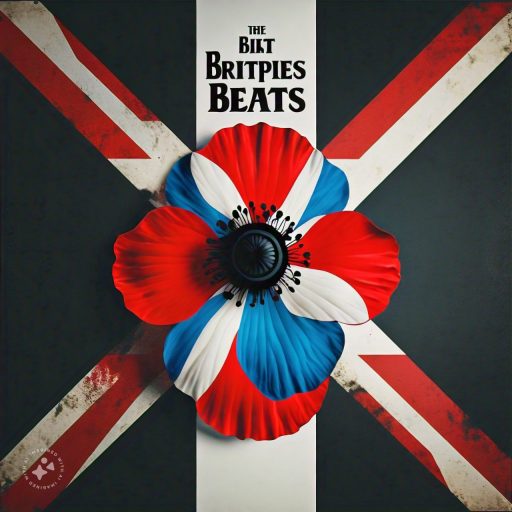Download (FREE) full album mix/stream in FLAC & MP3 (320 Kbps) audio formats: britpoppies.zip (852.2 MB)
“Working Beats” is a fictitious 1994 album by the fictitious Britpop band “The Britpoppies.” The songs paint a vivid picture of life in Manchester, England during the 1990s Britpop era. The lyrics capture the struggles, hopes, and camaraderie of everyday people facing a difficult economic climate. The lyrics convey a sense of resilience and defiance, highlighting the importance of community, friendship, and finding joy amidst hardships. The songs’ messages resonates with listeners who can identify with themes of perseverance and finding hope in challenging times.
The Britpoppies: A Table of Contents
I. Cityscapes and Dreams
This section explores the themes of urban life, hope, and struggle in a city that is both vibrant and challenging. The lyrics depict the daily grind of working-class life, the search for meaning and connection, and the enduring spirit of the people.
a. Glowing and Shimmering: Images of city lights and fast-paced living contrast with the challenges of poverty and uncertainty. b. Concrete Jungle: The city is described as both a source of hardship and a place of resilience, where people find strength in community. c. Footsteps and Dreams: The streets echo with the dreams and aspirations of the city’s inhabitants, while the lyrics also acknowledge the broken dreams and struggles along the way.
II. The Power of Unity and Hope
This section highlights the importance of community, friendship, and love in overcoming adversity. The lyrics celebrate the bonds that unite people and provide solace in difficult times.
a. Brothers Sharing the Burden: The shared experiences of hardship and hope create a strong sense of brotherhood and solidarity. b. Families and Love: Family is portrayed as a source of love, support, and strength, offering a haven from the challenges of the world. c. Finding Strength in Pain: The lyrics acknowledge the pain and struggles of life, but also emphasize the importance of finding hope and strength within oneself and in others.
III. Musical Journeys and Inner Struggles
This section delves into the lives of musicians, their artistic pursuits, and the search for self-discovery. The lyrics capture the challenges and rewards of a life dedicated to music.
a. Rusty Miles to Go: The imagery of a worn guitar and dusty roads evokes the itinerant nature of a musician’s life and the constant pursuit of their dreams. b. Escaping Through Music: Music provides an escape from the mundane and a way to express emotions and experiences. c. Chasing Ghosts: The pursuit of musical success is fraught with challenges, including self-doubt and the pressure to conform.
IV. Love, Longing, and Lost Connections
This section explores themes of love, heartbreak, and the bittersweet nature of relationships. The lyrics express a yearning for connection and the pain of lost love.
a. Dreaming in the Quiet Night: The speaker observes a passerby and longs to connect with them, but hesitates to break the ice. b. Secret Hearts and Unspoken Walls: Unexpressed feelings and the fear of rejection create barriers between people. c. Echoes of What Could Be: Memories of past relationships haunt the present, reminding the speaker of what was lost.
V. The Weight of Loneliness and Despair
This section delves into the darker aspects of urban life, exploring feelings of isolation, disillusionment, and despair. The lyrics depict the struggles of individuals grappling with poverty, addiction, and a sense of hopelessness.
a. Struggles in the Stone: The city is portrayed as a harsh and unforgiving environment, where individuals struggle to survive. b. Crowded Rooms, Lonely Hearts: Despite being surrounded by people, the speaker feels a profound sense of isolation and alienation. c. No Way Out: The lyrics express a feeling of being trapped in a cycle of poverty and despair, with no escape in sight.
VI. Resilience and Finding the Light
This section returns to themes of resilience and hope, even in the face of adversity. The lyrics emphasize the importance of finding strength within oneself and in the small moments of joy and beauty.
a. Tears Mixed with the Rain: The speaker finds solace in the cleansing power of rain, washing away the pain and sorrow. b. Brick by Brick: The city is rebuilt brick by brick, symbolizing the slow and steady process of rebuilding lives and finding hope. c. The Fire in Our Souls: Despite the challenges they face, the people retain a spark of hope and a determination to keep fighting for a better future.
Britpop and the UK Working Class – Themes and Ideas
This document analyzes the provided lyrics, presumed to be from a Britpop song titled “The Britpoppies – Working Beats 1994,” to identify key themes and ideas.
Main Themes:
- Working-Class Life: The lyrics depict the daily grind of working-class life in Manchester, marked by financial struggles (“living fast but Pockets thinner”), monotonous jobs (“working hard from 9 to 5 struggling just to stay alive”) and a yearning for escape.
- Urban Landscape: The city of Manchester is a key setting, characterized as a “Concrete Jungle” that both confines and energizes its inhabitants. The imagery of “streets so narrow” and “Cloudy Skies” contrasts with the vibrant energy of “city lights” and “midnight beats.”
- Resilience and Hope: Despite the hardships, the lyrics celebrate resilience and optimism. Phrases like “Rough and Ready we won’t break,” “finding hope in every day,” and “we rise with the sun” emphasize a spirit of endurance and a belief in a brighter future.
- Community and Belonging: The lyrics highlight the importance of community and friendship in navigating the struggles of life. Shared experiences like “Friday nights and weekend cheers” and gathering around “the old Cafe” foster a sense of belonging and solidarity.
- Music as a Lifeline: Music emerges as a source of solace and expression, evident in lines like “strumming with BS and strings singing songs of Simple Things” and “music my compass wherever I roll.” It serves as a unifying force and an outlet for shared emotions.
Important Ideas/Facts:
- Britpop Context: The song’s title and content place it firmly within the Britpop movement of the 1990s, which often reflected on working-class experiences and British identity.
- Manchester Identity: The repeated mention of “Manchester Hearts” suggests a strong sense of local pride and connection to the city’s musical heritage.
- Struggle and Aspiration: The lyrics capture a sense of tension between the hardships of daily life and the aspirations for something more, reflecting the wider social context of the time.
- Nostalgia and the Past: References to “Echoes of the past we keep” and “Memories” suggest a longing for simpler times, perhaps reflecting a sense of loss or uncertainty about the future.
Notable Quotes:
- “Rough and Ready we won’t break Manchester Hearts can’t fake”: This line encapsulates the themes of resilience and local pride.
- “Concrete Jungle brings us down fighting through the darking gray finding hope in every day”: This captures the dual nature of city life, both oppressive and inspiring.
- “music my compass wherever I roll from the factory grind to Open Sky”: This highlights music’s role as a vehicle for escape and personal freedom.
- “in the struggle we find our way in the silence we build the day”: This emphasizes the importance of perseverance and finding meaning in everyday life.
Overall Impression:
The lyrics paint a poignant and relatable picture of working-class life in Manchester, characterized by struggle, resilience, and a deep sense of community. They offer a glimpse into the social and cultural landscape of 1990s Britain.
Britpoppies FAQ
1. What is the central theme of “The Britpoppies: Working Beats 1994”?
The overarching theme is the resilience and camaraderie of working-class people in Manchester. The lyrics depict their struggles with poverty, the monotony of daily life, and the search for hope amidst urban decay. Despite these challenges, they find strength in their shared experiences, their music, and their unwavering spirit.
2. How does the imagery of Manchester contribute to the songs’ meaning?
Manchester is portrayed as a “concrete jungle” full of “dark and gray” streets, representing the harsh realities of their environment. However, there are also images of “glowing” city lights, “sparking” dreams, and a “heartbeat” that pulsates throughout the city. This duality reflects the bittersweet nature of their existence, where hardship and hope coexist.
3. What role does music play in the lives of the Britpoppies?
Music is their outlet, their escape, and their source of unity. They “sing songs of simple things” and find solace in the “echoes” of their shared musical heritage. The lyrics describe “broken guitars” and “cheap mikes,” suggesting that music is more than just a hobby; it’s a lifeline and a way to express their collective voice.
4. What are some of the recurring motifs in the lyrics?
Several motifs appear throughout the songs, including:
- Walking streets: This emphasizes their constant movement and the journey they are on, both literally and metaphorically.
- Midnight beats: The rhythm of the city and the pulse of their lives.
- Cloudy skies: Reflecting the often gloomy atmosphere of Manchester and the challenges they face.
- Hope and dreams: Despite their struggles, they hold onto the belief that a better future is possible.
5. How does the language used in the lyrics reflect the Britpoppies’ experiences?
The language is raw, honest, and often colloquial, reflecting the authentic voices of the working class. There is a sense of urgency and immediacy in their words, as if they are pouring their hearts out directly to the listener.
6. What is the significance of the title “Working Beats 1994”?
The title emphasizes the two key elements of the Britpoppies’ identity: their working-class background and their music. “Working Beats” suggests that their music is born out of their daily experiences, while “1994” places them within a specific historical and cultural context.
7. What message do the Britpoppies convey about community?
The lyrics repeatedly emphasize the importance of friendship, family, and shared experiences. They find strength in their “brothers” and “friends” who are “family in the fight.” This sense of community helps them to cope with their struggles and to find moments of joy in the midst of adversity.
8. What is the overall tone of “The Britpoppies: Working Beats 1994”?
The tone is a complex mix of defiance, hope, and melancholy. While acknowledging the hardships they face, the lyrics ultimately express a resilient spirit and a belief in the power of community and music to overcome adversity.
Britpoppies: Working Beats 1994 – Listening Guide
Glossary of Key Terms
- Britpop: A British rock music movement of the mid-1990s characterized by its catchy melodies, upbeat lyrics, and a focus on British themes and culture.
- Manchester: A city in Northwest England known for its industrial heritage and vibrant music scene, particularly in the 1980s and 1990s.
- Concrete Jungle: A metaphor for a city, emphasizing its dense, gray, and often impersonal nature.
- Council Flats: Public housing apartments in Britain, typically owned by the local government.
- Cobblestone Streets: Streets paved with rounded stones, often found in older European cities.
- Factory Grind: The repetitive and often monotonous nature of work in a factory.
- Amplifiers (Amps): Electronic devices used to increase the volume of musical instruments.
- Haunted Hosts: A metaphorical description of the lingering presence of past experiences or memories.
- Echoes of the Past: Remnants or reminders of past events, people, or feelings.
- Shining Light: A symbol of hope, guidance, and optimism in the face of challenges.
- Brothers: A term used to refer to close friends or comrades, emphasizing a sense of unity and solidarity.
Short-Answer Questions
- What are some recurring images used to depict the city in the lyrics?
- How do the lyrics portray the lives of working-class people in Manchester?
- What role does music play in the lives of the people described in the lyrics?
- What are some of the challenges and struggles that the lyrics address?
- Identify two examples of metaphors used in the lyrics and explain their meaning.
- What is the significance of the phrase “Echoes of the past we keep”?
- How do the lyrics portray the relationship between the people and their city?
- What are some of the symbols of hope and resilience that the lyrics present?
- How does the repetition of certain phrases and lines contribute to the overall meaning of the lyrics?
- What is the overall tone and mood conveyed in the lyrics?
Answer Key
- Recurring images of the city include concrete jungles, cobblestone streets, council flats, dim street lights, and factories. These images evoke a sense of urban grittiness and working-class life.
- The lyrics portray the lives of working-class people as a struggle, with themes of financial hardship, repetitive labor (factory grind), and the search for hope in a challenging environment.
- Music serves as an escape, a form of expression, and a source of unity for the people. It provides solace from the hardships of daily life and allows them to connect with one another.
- Challenges and struggles include poverty, the monotony of work, social isolation, and the feeling of being trapped in a system.
- Concrete Jungle: This metaphor compares the city to a jungle, highlighting its harshness, competitiveness, and lack of natural beauty.
- Shining Light: This metaphor represents hope, guidance, and the possibility of a better future amidst difficulties.
- “Echoes of the past we keep” suggests a strong connection to history and shared experiences, implying that the past shapes the present and influences the community’s identity.
- The relationship is complex, with feelings of both love and frustration. The city is both a source of hardship and a place of belonging, offering a shared identity and sense of community.
- Symbols of hope and resilience include music, friendship, love, and the determination to keep fighting for a better future. The “Shining Light” and the image of “rising with the sun” also represent optimism.
- Repetition emphasizes key themes and creates a sense of unity and shared experience. For example, the repeated line “we are the heartbeat of this town” reinforces the idea of a strong community spirit.
- The tone is a mix of gritty realism, hope, and defiance. The lyrics acknowledge the hardships of life in Manchester but also celebrate the resilience, spirit, and camaraderie of its people.
Essay Questions
- Analyze the ways in which “The Britpoppies: Working Beats (1994)” reflects the social and economic conditions of Manchester in the mid-1990s.
- Discuss the significance of music and community in the lyrics, providing specific examples to support your analysis.
- Explore the use of imagery and metaphor in the lyrics and how they contribute to the overall meaning of the piece.
- Examine the theme of hope and resilience in the face of adversity as presented in “The Britpoppies: Working Beats 1994.”
- How does the portrayal of urban life in these lyrics compare to other representations of cities in literature or music?
Learn More About Britpop
The Revival of British Music: A Look Back at the Iconic Britpop Era
Take a nostalgic journey back to the 1990s, an era where British music underwent a cultural renaissance that reshaped the soundscape not only of the UK but of the world. This was the Britpop era—marked by jangly guitars, sharp wit, and a defiant rejection of the grunge scene across the Atlantic. The bands that emerged during this time became cultural icons, leaving an indelible mark on the history of British music.
The Emergence of Britpop: A Cultural Phenomenon
The early 1990s heralded the rise of a new British sound known as Britpop, which celebrated all things British—from fashion to class identity. Defined by catchy melodies, sardonic lyrics, and a self-assured swagger, bands like Oasis, Blur, Pulp, and Suede became the movement’s ambassadors. They infused a sense of national pride into the UK’s music scene, offering an alternative to the grunge-dominated American rock that had been dominating the charts.
This movement wasn’t just about music—it was about reclaiming British culture in a post-Thatcherite era. For a deeper understanding of the socio-political context that fueled Britpop’s rise, check out this retrospective on British politics and culture in the 1990s.
The Retro Revival: Drawing from Past Icons
A key characteristic of Britpop was its homage to the past. Artists frequently drew inspiration from the rock and pop sounds of the 1960s and 1970s. Oasis channeled the melodic structures of The Beatles, while Blur incorporated elements of punk and new wave, reminiscent of bands like The Kinks. This sense of musical nostalgia gave Britpop a fresh yet familiar sound, appealing to a generation of listeners yearning for something different from the grunge and industrial music flooding the airwaves.
At its heart, Britpop was a modern reinterpretation of classic British rock. For instance, Pulp’s iconic album Different Class was both socially aware and sonically grounded in retro rock vibes, a brilliant example of how the genre revived storytelling in music. Discover more about the classic rock influences on Britpop through this BBC article on Britpop’s roots.
Lyrical Storytelling and British Identity
Britpop’s success was not just about its sound, but also its ability to capture the imagination of a generation. The storytelling within the lyrics reflected the lives and challenges of working-class Britain. Pulp’s Common People is an anthem of disillusionment, encapsulating class divides, while Oasis’ Don’t Look Back in Anger remains a timeless call for hope and unity.
This relatable lyrical content set Britpop apart from its contemporaries. Its ability to blend wit, satire, and cultural commentary, whether in Blur’s parodic Parklife or Suede’s tales of urban alienation, allowed Britpop to transcend beyond mere pop songs into social commentary. For an in-depth look at Britpop’s lyrical themes, take a look at this analysis of Britpop lyrics.
The Oasis vs Blur Rivalry: The Battle for Britpop Supremacy
No discussion of Britpop is complete without mentioning the legendary rivalry between Oasis and Blur. This “Battle of Britpop” culminated in 1995 when both bands released singles on the same day—Oasis’ Roll With It versus Blur’s Country House. The media hyped it as a cultural war: working-class Northern grit (Oasis) versus middle-class Southern art school cool (Blur).
Blur won the chart battle, but Oasis arguably won the war, as their album (What’s the Story) Morning Glory? became one of the best-selling records in UK history. The rivalry, however, was more than just a publicity stunt—it mirrored deeper social and class divides within British society. You can read more about the infamous Britpop battle in this NME feature.
Interestingly, in later years, former rivals Damon Albarn and Noel Gallagher buried the hatchet, even collaborating together. With rumors swirling about an Oasis reunion, fans are speculating whether we might see an Albarn-Gallagher collaboration on stage or even the studio. Perhaps it’s the reconciliation Britpop fans deserve.
Beyond Oasis and Blur: Diversity in the Britpop Scene
While Oasis and Blur dominated the headlines, Britpop’s breadth extended far beyond these two giants. Bands like Supergrass, Elastica, and The Verve contributed to the era’s rich tapestry of sounds. Supergrass brought a raw, punk energy, while Elastica merged post-punk with minimalist new wave. The Verve, with their ethereal, orchestral rock, released Urban Hymns, an album still regarded as one of the greatest of the decade.
Britpop wasn’t just a genre—it was a movement, a creative explosion that blurred the lines between art, music, and culture. Explore this ultimate guide to lesser-known Britpop bands.
The Legacy of Britpop: Still Relevant Today
Although Britpop’s golden era began to fade by the late 1990s, its legacy continues to influence contemporary music. Artists today, from Arctic Monkeys to The 1975, often cite Britpop as an essential influence on their sound. Its impact can be felt in the resurgence of guitar-driven indie rock and the enduring appeal of anthemic sing-alongs.
Britpop wasn’t just a fleeting moment in music history—it was a cultural force that shaped the identity of an entire generation. Even as new genres take center stage, the Britpop spirit—its boldness, its humor, its rawness—lives on in the music we listen to today. For a trip down memory lane, revisit the era with this comprehensive playlist of Britpop classics.
Britpop: A Nostalgic Look at a Defining Musical Era
This briefing document examines the Britpop movement, drawing information from a blog post on the TATANKA website entitled “The Britpoppies – Working Beats (1994)”. The document explores the origins of Britpop, key bands and their influences, lyrical themes, and the lasting legacy of the movement.
The Genesis of Britpop: Emerging in the early 1990s, Britpop was a musical reaction against the dominance of American grunge. It marked a cultural shift, celebrating British identity and offering a more optimistic and melodic alternative.
Key Players and Influences: Bands like Oasis, Blur, Pulp, and Suede spearheaded the movement, drawing inspiration from 1960s and 1970s British rock icons such as The Beatles and The Kinks. Oasis channeled The Beatles’ melodic structures, while Blur incorporated elements of punk and new wave.
Lyrical Storytelling and British Identity: Britpop was not just about catchy tunes, but also about relatable lyrics that reflected the lives and challenges of young people in Britain. Pulp’s “Common People” addressed class divides, while Oasis’ “Don’t Look Back in Anger” became an anthem of hope and unity. Blur’s “Parklife” and Suede’s tales of urban alienation showcased the movement’s ability to weave wit, satire, and social commentary into their music.
The Oasis vs. Blur Rivalry: The rivalry between Oasis and Blur, dubbed the “Battle of Britpop,” was a significant cultural moment. The media portrayed it as a clash between working-class Northern grit (Oasis) and middle-class Southern art school cool (Blur). While Blur won the chart battle with “Country House” in 1995, Oasis’ album “(What’s the Story) Morning Glory?” achieved greater commercial success, becoming one of the best-selling albums in UK history.
Beyond the Big Names: The Britpop scene was incredibly diverse, with bands like Supergrass, Elastica, and The Verve contributing to its rich tapestry of sound. Each brought their unique style to the movement, further solidifying its impact on British music.
Britpop’s Enduring Legacy: Even though Britpop’s peak faded by the late 1990s, its influence is still felt today. Contemporary artists like Arctic Monkeys and The 1975 cite Britpop as a major influence, and its legacy can be seen in the resurgence of guitar-driven indie rock.
Conclusion: Britpop was more than just a musical genre; it was a cultural phenomenon that captured the spirit of a generation. Its energy, humor, and raw emotion continue to resonate today, reminding us of a time when British music was bold, innovative, and unapologetically itself.
FAQ
What was Britpop?
Britpop was a British music and cultural movement that emerged in the early 1990s. It was characterized by its catchy melodies, guitar-driven sound, and lyrical focus on British identity and working-class life. Britpop bands often drew inspiration from 1960s and 1970s British rock bands, giving the movement a retro feel while remaining distinctly modern.
What were the key characteristics of Britpop music?
Britpop music was typically upbeat and energetic, with a focus on strong melodies and sing-along choruses. It often featured jangly guitars, driving bass lines, and a raw, energetic feel. Lyrically, Britpop songs explored themes of Britishness, everyday life, and social class.
Which bands were central to the Britpop movement?
Some of the most prominent Britpop bands included:
- Oasis: Known for their anthemic rock songs and the notorious Gallagher brothers, they championed a working-class attitude and a love for classic British rock.
- Blur: A more art-school influenced band, they incorporated elements of punk, new wave, and British pop culture into their music.
- Pulp: Led by Jarvis Cocker, they were known for their sharp, observational lyrics and tales of working-class life.
- Suede: They brought a glam-influenced aesthetic and explored themes of androgyny and urban alienation.
What was the “Battle of Britpop”?
The “Battle of Britpop” was a media-fueled rivalry between Oasis and Blur, which reached its peak in 1995 when both bands released singles on the same day. This rivalry became symbolic of a larger cultural divide in Britain at the time.
How did Britpop reflect British culture at the time?
Britpop emerged in a time of social and political change in Britain, following the years of Conservative rule under Margaret Thatcher. It reflected a renewed sense of optimism and national pride among young people, while also addressing issues of class, identity, and disillusionment.
Was Britpop just about Oasis and Blur?
While Oasis and Blur were the most visible faces of Britpop, the movement was much more diverse. Bands like Pulp, Suede, Supergrass, Elastica, and The Verve all contributed significantly to the era’s sound and cultural impact.
What is the legacy of Britpop?
Britpop’s influence can still be felt in British music today. Many contemporary bands cite Britpop as an inspiration, and the movement’s emphasis on guitar-driven rock and catchy songwriting continues to resonate with audiences.
Where can I find out more about Britpop?
Numerous resources are available online and in libraries that delve deeper into Britpop:
- Articles and documentaries: Search for articles on music websites like NME and the BBC, and explore documentaries on streaming platforms.
- Books: Many books have been written about the Britpop era, offering in-depth analyses and perspectives on the movement.
- Music: The best way to experience Britpop is to listen to the music! Create your own Britpop playlist or explore curated ones online.
